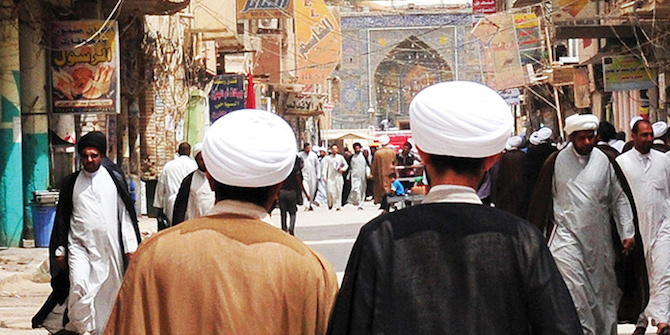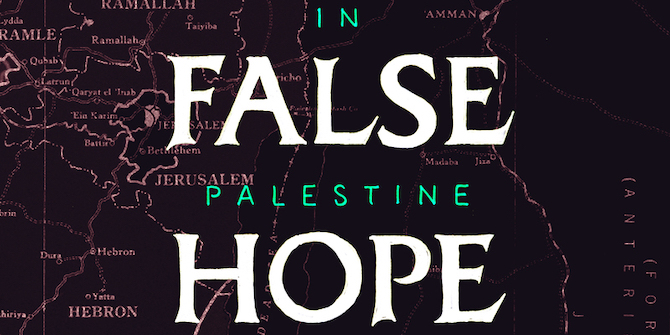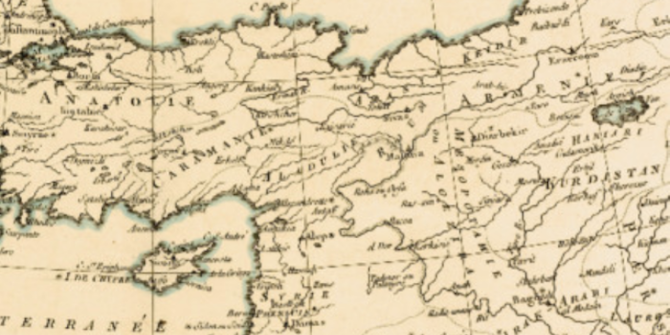by Wolfram Lacher

‘Everyday Politics in the Libyan Arab Jamahiriya’ is a revisionist analysis of the repression, socioeconomic malaise and international isolation that marked the final three decades of Muammar al-Qadhafi’s rule. Matteo Capasso claims that much of the existing work on Libya has wrongly reduced Qadhafi’s Jamahiriya to clichés: of a stateless, tribal society; of authoritarianism and an overfocus on the role of Qadhafi; as well as of a rogue state whose policies were driven by Qadhafi’s whims.
Capasso seeks to remedy these alleged flaws in the literature by retrieving ‘the lost voices of ordinary Libyans’ (p. 7), as well as by tracing the increasing repression and corruption that marked the regime back to the ‘geopolitical violence’ (p.45) unleashed by ‘the West’ on Libya. Qadhafi’s regime, Capasso argues, went on a hunt for the enemy within when faced with Western punishment for its anti-imperialist policies. Defeated militarily and ideologically, isolated by sanctions, the regime then abandoned its revolutionary and egalitarian ideals as its state elites turned into corrupt entrepreneurs. This, according to Capasso, spelled the regime’s progressive loss of legitimacy, and explains why it failed to rally broader support during the 2011 revolution (a term Capasso rejects). In sum, Capasso attempts to link ‘the quotidian to the regional and international’ (p. 4).
To make these arguments, Capasso primarily relies on narratives distilled from interviews with sixty-six Libyans residing abroad. Capasso does not appear to have conducted research in Libya, and he ignores much of the work produced by researchers who have spent extensive time in the country since 2011. His claim that conventional wisdom attributes Libya’s post-2011 conflicts to the unchanging, tribal and stateless nature of its society is akin to a strawman; in fact, none of the leading contributions to the study of Libyan politics present such a simplistic argument.
Among the insights Capasso generates from his interviews, his most interesting contribution concerns the uses and consequences of regime surveillance. He draws on his interlocutors’ stories to show that ordinary Libyans exploited the regime’s massive surveillance apparatus for their own personal interests. The agency of ordinary Libyans thereby helped to spread a culture of suspicion whose impact is felt to this day. This is by no means a surprising observation, since it matches analyses of other authoritarian regimes. Nevertheless, it had previously not been made as clearly elsewhere in the small body of literature on state-society relations in Qadhafi’s Libya.
However, Capasso badly overstretches this observation by concluding from the individual exploitation of the regime’s intelligence apparatus that Qadhafi’s Libya should not be viewed as authoritarian (p. 45), and that conventional analyses had attributed too much power to Qadhafi. Ironically, Capasso himself undercuts this argument by dedicating much of the book to the role and image of Qadhafi and his sons. Had Capasso succeeded in convincingly relativising Qadhafi’s role, this would have been a major contribution. But it would have required combining his use of anecdotes with a more tangible analysis of how the upper echelons of the regime’s security apparatus functioned – and such an analysis would certainly have rendered Capasso’s rejection of ‘authoritarianism’ untenable.
The book’s biggest – indeed, unpardonable – flaw is the way Capasso harnesses his narratives with facts and causal relationships that are either insufficiently supported by evidence or downright dubious. This includes the way in which he attributes primary responsibility for the regime’s increasingly repressive turn to Western states’ military confrontations with Libya, their support for opposition groups and their sanctions against the country. To make his case, Capasso pretends that repression hardened from the early 1980s onwards (p. 35ff.). In fact, show trials and waves of imprisonment had become common since a 1975 coup attempt, and they were a logical corollary of Qadhafi’s rapid concentration of power, rather than a mere reaction to confrontation with the West.
Capasso also argues that Western accusations of Libyan state support for terrorism were often unsubstantiated by evidence, and driven by a willingness to discipline the regime for its challenge to the ‘Western global order’ (p. 35). His attempts to demonstrate this point seem disingenuous, such as when he states that German prosecutors established ‘that there was no proof that “Colonel Qaddafi was behind the attack”’ (p. 32) on the LaBelle discotheque in Berlin – while omitting that the same ruling attributed responsibility for the attack to Libya. Or when he extensively discusses the doubts surrounding responsibilities for the Lockerbie bombing, while entirely neglecting that a French court found six Libyans, including Qadhafi’s intelligence chief, responsible for the 1989 bombing of UTA Flight 772.
Capasso even resorts to conspiracy theories, asserting that UK intelligence agencies supported the Libyan Islamic Fighting Group (LIFG) in its operations against Qadhafi during the 1990s. For this claim, he relies on the account of a former MI5 employee – as relayed by his then wife, also an ex-MI5 employee – who later became better known for declaring himself to be the Christ. Capasso buries the fact that ‘these allegations have never been independently confirmed’ (p. 38) in a footnote and has no qualms repetitively presenting the alleged UK support for the LIFG as a hard fact throughout the book.
Serious problems also bedevil Capasso’s analysis of Libya’s socioeconomic evolution. He attributes the failure of what he calls the regime’s ‘more progressive model of economic development’ (p. 116) and its devolution into corruption and consumerism primarily to Western policies ‘designed to punish the Libyan government and hurt its entire population’ (p. 108). The embargo, Capasso argues, ultimately left the regime ideologically defeated, forcing it to allow inequalities and corruption to grow. To make this argument, Capasso largely ignores the intrinsic limits and risks of the regime’s economic policies during the 1970s and 1980s, which relied exclusively on state employment and the importation of practically everything other than oil, and made it highly vulnerable to the oil price shock of the 1980s. Nor does Capasso consider that corruption could have flourished inside the public sector even before the sanctions.
Capasso’s analysis of Libya’s socioeconomic trajectory builds up to his view that in 2011, the yearning for improved material conditions, rather than freedom, ‘lay at the core of the demands and struggle that many people pursued in 2011’ (p. 122). Somewhat incredibly, Capasso maintains that Libyans’ ‘aspiration for capitalist modernity in the fashion of Dubai’ led them to align ‘themselves optimistically with the [NATO] military intervention, regarding it as a necessary tool to modernize, develop, and reform their country’ (p. 155). He entirely omits that, by the time calls for an intervention were growing, the uprising against Qadhafi had already turned into an armed conflict, with areas that escaped regime control under imminent threat of being violently recaptured. That imminent threat, rather than a yearning for Dubai, clearly drove demands for foreign intervention. It is unclear whether Capasso’s claim is due to a possible selection bias in the choice of his interlocutors – and the fact that he did not conduct any interviews in Libya – or to his readiness to bend his material to serve his ideological tenets. The latter, as should have become clear in this review, colour the entire book to an extent that render its use as a reference inadvisable.
[To read more on this and everything Middle East, the LSE Middle East Centre Library is now open for browsing and borrowing for LSE students and staff. For more information, please visit the MEC Library page.]






